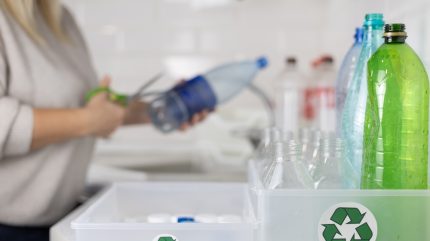
In the journey towards a circular economy, recycling efficiency is more important than ever. A small innovation is making a big difference: wash-off labels.
These specialised labels are designed to detach cleanly from containers, allowing materials to be recycled without contamination and supporting a more sustainable approach to packaging.

Discover B2B Marketing That Performs
Combine business intelligence and editorial excellence to reach engaged professionals across 36 leading media platforms.
What are wash-off labels?
Wash-off labels are created with adhesives that dissolve or detach easily during standard cleaning processes.
Unlike conventional labels that often leave sticky residues, these labels separate cleanly from containers, making recycling smoother and more effective.
The adhesive is typically water-soluble, meaning it can be removed during industrial washing or recycling treatments. This is particularly useful for bottles and containers that are reused multiple times, such as those in the beverage and food industries.
By allowing clean separation of the label, wash-off labels ensure recycled materials remain pure and suitable for producing new containers.

US Tariffs are shifting - will you react or anticipate?
Don’t let policy changes catch you off guard. Stay proactive with real-time data and expert analysis.
By GlobalDataBenefits for recycling and reuse
The main advantage of wash-off labels is the improvement they bring to recycling streams.
Contaminants from traditional labels can reduce the quality of recycled materials, especially PET (polyethylene terephthalate), which is widely used in bottles. Wash-off labels minimise these issues, resulting in higher-quality recycled products.
They also make container reuse more efficient. Beverage bottling operations, for example, benefit when bottles can be returned, washed, and refilled without leftover adhesives interfering with the process.
This reduces waste, conserves resources, and supports the reuse of materials.
Industry applications and impact
Wash-off labels are used across multiple sectors. In food and beverage, they allow PET bottles to be cleaned and recycled without contamination.
In logistics, reusable containers fitted with wash-off labels can be washed and reused multiple times, reducing overall packaging waste.
The cosmetics and personal care sectors also benefit, as products packaged in PET or HDPE (high-density polyethylene) become easier to recycle when equipped with wash-off labels.
Consumers increasingly demand sustainable packaging, and these labels help brands meet those expectations while maintaining product quality.
Moving towards sustainable packaging
As environmental awareness grows, the demand for packaging that supports recycling and reuse is rising.
Wash-off labels play a key role in this transition by facilitating clean label removal and preserving material quality.
Future innovations may enhance these labels further, improving water efficiency, reducing energy consumption, and expanding compatibility with a wider range of packaging materials.
By adopting wash-off labels, industries can contribute significantly to a circular economy, reducing environmental impact while promoting responsible use of resources.





